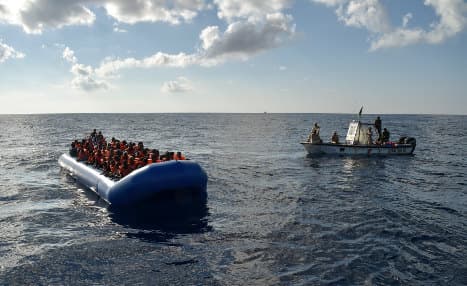Rare happy ending in Mediterranean migrant drama

Most members of a group of 146 migrants
reported missing, feared dead, this week in the Mediterranean were rescued and
safely brought to Italy, it emerged on Thursday.
In a rare piece of good news in Europe's deadly migrant crisis, the International Organisation for Migration (IOM) said a Gambian survivor who had thought all his fellow passengers on a packed rubber dinghy had perished had been mistaken.
In fact, 140 of them were rescued at the same time as he was plucked from the water, suffering from severe dehydration and hypothermia. One body was recovered and five people remain unaccounted for.
In his semi-conscious state after hours clutching a petrol container, the Gambian survivor did not realise the others had been transferred to an Italian coastguard boat while he was rushed by a Spanish navy vessel to hospital on the Italian island of Lampedusa.
The confusion was cleared up when some of the group of 140 survivors were shown a picture of the young Gambian on Thursday.
"They recognised him, told us his name. Some of his friends burst into tears when they saw him safe and sound," IOM spokesman Flavio di Giacomo told AFP.
According to an IOM count, 590 migrants have died trying to make the Libya-Italy crossing on people traffickers' boats so far this year.
Some 24,200 people have been rescued and registered at Italian ports, according to the Interior Ministry. Both figures are sharply up on the same period last year, despite mounting efforts to stop the flow at source in Libya.
Comments
See Also
In a rare piece of good news in Europe's deadly migrant crisis, the International Organisation for Migration (IOM) said a Gambian survivor who had thought all his fellow passengers on a packed rubber dinghy had perished had been mistaken.
In fact, 140 of them were rescued at the same time as he was plucked from the water, suffering from severe dehydration and hypothermia. One body was recovered and five people remain unaccounted for.
In his semi-conscious state after hours clutching a petrol container, the Gambian survivor did not realise the others had been transferred to an Italian coastguard boat while he was rushed by a Spanish navy vessel to hospital on the Italian island of Lampedusa.
The confusion was cleared up when some of the group of 140 survivors were shown a picture of the young Gambian on Thursday.
"They recognised him, told us his name. Some of his friends burst into tears when they saw him safe and sound," IOM spokesman Flavio di Giacomo told AFP.
According to an IOM count, 590 migrants have died trying to make the Libya-Italy crossing on people traffickers' boats so far this year.
Some 24,200 people have been rescued and registered at Italian ports, according to the Interior Ministry. Both figures are sharply up on the same period last year, despite mounting efforts to stop the flow at source in Libya.
Join the conversation in our comments section below. Share your own views and experience and if you have a question or suggestion for our journalists then email us at [email protected].
Please keep comments civil, constructive and on topic – and make sure to read our terms of use before getting involved.
Please log in here to leave a comment.